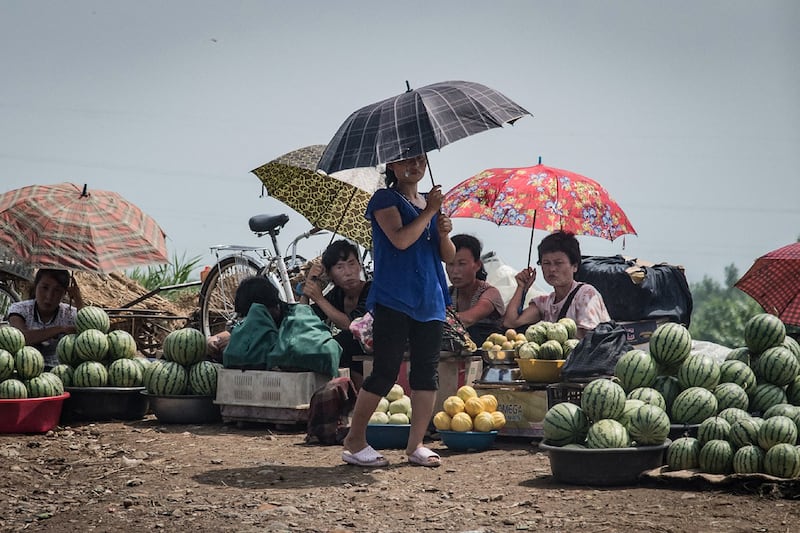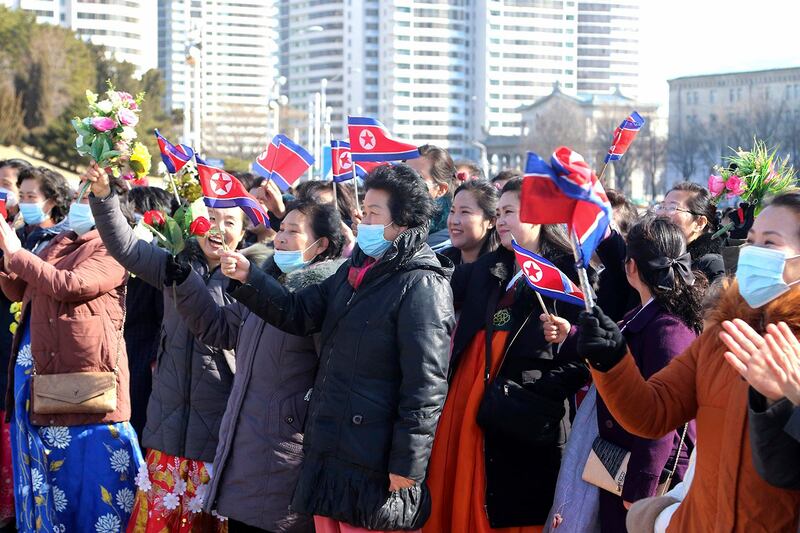Kang Ju-young, a North Korean escapee in her 20s who now lives in Seoul, said her desire to get married faded as she watched her mother toil long hours in the marketplace – on top of doing all the household chores and childcare.
It was not a lifestyle she wanted for herself.
“Men are supposed to be the breadwinners… but in reality, women end up carrying a heavy burden,” said Kang, who fled in 2017 and used a pseudonym for personal safety reasons.
“They have to go out to work, take care of the children, and make money,” she said. “Seeing others struggle with these responsibilities can make you feel pressured, contributing to our reluctance to get married.”
Many North Korean women feel similarly, and are avoiding marriage and having children, escapees and experts who work with them say.
That’s contributing to the reclusive country’s declining birth rate, much to the chagrin of supreme leader Kim Jong Un. It has fallen to 1.79 last year from 1.88 in 2014, according to estimates from South Korea’s National Statistical Office. This is considered low for a developing country, and is roughly the same rate as developed economies like France, Iceland and Mexico.
At a conference for mothers in December – the first such gathering in 11 years – Kim exhorted women to bear children and “carry forward our revolution.”
But for many young North Korean women, there is little appeal.
‘Jangmadang generation’
Dramatic economic changes in North Korea have been a major factor.
Kang and other women of her age are called the "jangmadang generation" because they came of age during the emergence of jangmadang, or marketplaces, that popped up across the country after the collapse of the Soviet Union in the early '90s and the end of aid from Moscow.
These markets were born out of necessity and are run almost entirely by women.
North Korean men were – and still are – required to go to their government-assigned jobs, but their state-set wages are hardly worth anything.
So it has fallen to their wives to support the family. For many, that means selling things in the market, on top of doing the housework and raising the children. Now these informal marketplaces are a mainstay of the modern North Korean economy.

As a result, however, women of the jangmadang generation generally see marriage and children not so much as treasures and joys, but more as hardship and sacrifice, said Oh Eunkyung, a psychologist at the Seoul-based Korean Counseling Psychological Association who counsels escapees.
“They saw marriage and childbirth [in North Korea] as factors that stifle and make their lives difficult,” she said. They instead yearn for easier lives with more freedom where they pursue their own happiness.
Oh says she sees stark differences between generations of North Koreans who grew up before or after the emergence of these markets.
"Children born into the jangmadang generation were still hungry even as their mothers toiled away in the marketplace," she said. "They continue to hear their mothers complain about hard work."
Exposure to capitalism, drama
Younger women have also been exposed to new ideas – partly thanks to these markets. Simply running a family business and competing with other stalls has introduced them to capitalism, Oh said.
They also know more about South Korea and the outside world, thanks to the flood of movies and songs that are smuggled into the country and watched in secret. Getting caught watching them can get North Koreans in serious trouble.
“They learned that what they saw in TV shows actually occurs by hearing from their family members or relatives who escaped,” said Oh. “Their perception changes as they see others who live differently in South Korea.”

Interviews with three North Korean women by Osaka-based media outlet Asia Press, which focuses on North Korea coverage, regarding their thoughts on marriage and children reflected many of the same sentiments.
They said that the hardships of living were the biggest obstacle to marriage and childbirth.
The two women in their 40s said there is a tendency for younger women not to get married and have children. The woman in her 30s said she was herself avoiding tying the knot.
Government policies to encourage people to have children should focus on making it easier to raise families through improving North Korea’s living situation, they said.
But instead, people are dragged into ideological education sessions where they are told that getting married and having children are their duty to the nation.
Punitive policies
In some cases, the government policy to encourage marriage has been punitive, said Jiro Ishimaru, the head of Asia Press.
“The preference for living together instead of marriage has become clear due to the burden of marriage and childbirth in North Korea,” he said. “Crackdowns on [cohabitation] have thus increased in scope.”
Experts predict that policies that punish will however further discourage women from getting married or having kids.
Oh said that no matter how much ideological education the North Korean authorities provide, younger North Korean women have learned to be self-reliant, and they see the state as mostly unhelpful.
Their priority is on living well, and marriage and childbirth are obstacles to this, she said.
“In order to solve the low birth rate problem in North Korea, the authorities continue to implement coercive and oppressive policies such as sending a couple to labor camps to punish them if they are caught cohabiting,” said Oh.
That will only cause a backlash and generate more distrust, she said.

The birth rate in North Korea has already declined to the point where it cannot be raised through policy, said Ahn Kyungsoo, the head of DPRK Health, which maintains a website discussing health issues on the Korean peninsula.
“As North Korean women are more deeply exposed to inflows of external culture, become more independent, engage in more economic activities, the North Korean system seems to have passed the stage of solving the low birth rate through policy,” he said.
“It is too difficult for North Korean authorities to reverse the trend because the psychological atmosphere [of avoiding childbirth] is dominating women [in North Korea] now.”
Kang, the escapee, recalled that prior to her escape, marriage was the furthest thing from her mind.
“I had no intention of getting married back then,” she said. “I had my own life and thought that if I get married, I wouldn’t like the idea of having to carry my child to work, losing the person I am, and living only for the purpose of being ‘Mom…’ I thought ‘I want to be myself, not someone’s mom.’”
Translated by Claire S. Lee. Edited by Eugene Whong and Malcolm Foster.
